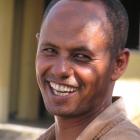
Country Director | IRC Ethiopia
Lemessa Mekonta is the Country Director for IRC WASH Ethiopia based in Addis Ababa.
He has diversified and hands on experiences in different aspects of water resources, water supplies, and sanitation working for government, private businesses and NGOs in various capacities ranging from expert to managerial level. Key areas of his experiences include program strategy development, partnership facilitation and coordination with different actors, project management, provision of trainings on water supplies, study and design for rural and urban water supplies, urban water utility management, water quality monitoring, leading action research including rural water supply operation and maintenance with appropriate technology identification and use, and private service providers engagement.
Lemessa is a hydrogeologist by background with over 23 years' experience in water and sanitation sector.
This working document provides insights into current practice relating to social inclusion in integrated water resources management (IWRM) programmes... Read more...
Water access and its management are strongly influenced by gendered division of labour, communal power structures, cultural traditions, and daily... Read more...
Institutions are crucial to sustaining behavioural change throughout the entire sanitation value chain: from toilet access to emptying and transport... Read more...
This book/learning tool presents an approach for the comprehensive and integrated management of faecal sludge in urban and peri-urban areas of low-... Read more...
This report reviews the global progress made towards achieving SDG 6. It builds on the latest data available for the 11 SDG 6 global indicators. Read more...
An in-depth inclusive analysis on country-level accountability mechanisms towards Sustainable Development Goal 6 (SDG 6) on clean water and... Read more...
A discussion on ways to use existing systems to improve scale and sustainability of hygiene promotion efforts. Read more...
This study provides new evidence that WASH access and practices are associated with self-reported reproductive tract infection symptoms in rural... Read more...
This brief presents the lessons learnt and advocacy messages from this e-discussion for influencing sector discourse on this topic and ensuring that... Read more...
A lack of sanitation access in the community is a significant risk factor for anaemia and child growth stunting, but not for incidence of diarrhoea... Read more...
Should the Community-Based Management (CBM) model remain a central development strategy? Whay we need to know about water point functionality as it... Read more...
Ministers of Finance should increase funding for the enabling environment, make more use of micro and blended finance, and address the inequities in... Read more...
Spreading the cost of faecal waste removal over a series of monthly payments could make it more affordable for poor households and help kick start... Read more...
This publication has been produced by IRC as part of its independent monitoring and knowledge management services to the ONEWASH Plus programme. The... Read more...
Handwashing after contact with excreta is poorly practised globally, despite the likely positive health benefits. Read more...
An information guide to water, sanitation and hygiene (WASH) services in schools, health care facilities, the workplace, orphanages, prisons, refugee... Read more...
Monitoring and evaluation (M&E) need to be better integrated into government systems that will endure post-implementation. Further, there is a... Read more...
The Toolkit aims to assist anyone involved or planning to work in school hygiene, sanitation, and water. It describes basic principles, strategies... Read more...